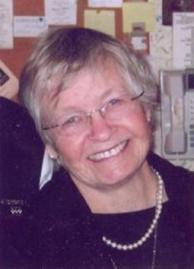Phyllis Hoge
Mission Memorial Auditorium
Saturday, May 5, 11:00 am
Introducing Maxine Hong Kingston, author of I Love a Broad Margin to My Life
Authors Pavilion
Saturday, May 5, 1:00 pm
Presenting her upcoming book of poetry, Hello, House, with illustrator Maxine Hong Kingston
Title of latest book: Hello, House (forthcoming) Illustrations by Maxine Hong Kingston
The Painted Clock: Memoirs of a New Mexico Ghost Town Bride
Hello, House:
Genre: Poetry
Daniel & Daniel Publishers; May 10, 2012
Paperback; $14.00; 80 pages
The Painted Clock:
Genre: Poetry
Wildflower Press; August 2002
Hardcover; $19.00; 274 pages
Excerpt available online
Brief description of Hello, House:
The poems in Hello, House, Phyllis Hoge’s new collection, center on the thoughts of a person working alone. Because the poet loves her house as she might love a genial forgiving friend, she can love and celebrate her housework. Even when a particular chore, such as dishwashing or putting up curtain rods, may involve one or two helpers, the real relationship in these poems is between a house and its resident person.
Hoge describes in small, significant detail what goes into daily chores, like making beds, doing laundry, ironing, cooking, cleaning, straightening. She also deals with crises and major upkeep, from insects to taxes. The maintenance, routine or occasional, of living in a house also carries on outdoors with gardening, beekeeping, feeding the birds, and painting the house.
She lavishes attention on favorite things: artichokes, wooden floors, oriental rugs, walnut sofa and chairs, and the monograms her mother stitched on towels. But in dealing with the physical aspects of daily life, she also examines herself, and learns that living in a house involves compromise: with pets, with clutter, with imperfection, with the realization that things get lost and that “all creation is dust.” The poems observe the many occasions when a domestic encounter may give rise to feelings of quiet thoughtfulness or annoyance or pleasure, feelings which may be both strong and private.
At the end, and at the beginning, of each day, Phyllis Hoge finds herself at home. As a poet, she works at home. And in this book her home inspires her work.
Brief description of The Painted Clock: The Painted Clock, Memoirs of a New Mexico Ghost Town Bride, is the true story of how a newly married couple, somewhat along in years, attempt to adapt themselves to the surprises of life in an almost uninhabited New Mexico ghost town called Mogollon. Husband and wife try to figure out each other as well as the character of their chosen home. The author explores her private responses to things—humorous or serious or quirky—and to the wonderful idiosyncrasies of the neighbors. The book offers a woman’’s often comic, sometimes moving, perceptions about a town she felt was “a man’s place” and about a man and a woman who lived there.
Reviews:
The Painted Clock is written as poetry in prose, drawing the reader into the landscape, the community, the story, the mind of the writer with keen observation of the inner skeleton of characters and relationships. Looking beyond surface presentation straight to the core, the author lets us experience Mogollon and its inhabitants as vibrant and real. She writes with clarity and wit and a wisdom that rejoices in watching life unfold.
“Engaging and beautifully written, The Painted Clock is an honest, painful, celebratory book, wise about human relations, human limitations, the value of place, and the always strange lurchings of the heart.”
– Debra Spark, author of The Ghost of Bridgetown
Phyllis Hoge, who now lives in Albuquerque, taught poetry for many years at the University of Hawai‘i. Writing under the name Phyllis Thompson, she devoted her energies to her four children and to her poetry. Over the years she has published seven books, the first, Artichoke, with the University of Hawai‘i Press. In 1966, islanded on O‘ahu, she initiated the first Poets in the Schools program in the United States of America, making Hawai‘i the first state to have the program. One of the two founders of the Hawai‘i Literary Arts Committee, in 1996 she received the Hawai‘i Award for Literature. Hoge’s poetry has been widely published in periodicals, including Hudson Review, New Yorker, Prairie Schooner. Since leaving Honolulu, when she is not making up for lost time traveling on this continent or others, she has continued publishing her work, most recently Letters from Jian Hui and Other Poems and a prose memoir, The Painted Clock: Memoirs of a New Mexico Ghost Town Bride. Hello, House, her new book, consists of poems about domestic tasks, each illustrated by her former landlady, Maxine Hong Kingston. Recently she has begun publishing under her family name, replacing Phyllis Thompson, her former nom de plume.
Maxine Hong Kingston has written three novels and several works of non-fiction about the experiences of Chinese immigrants living in the United States. She has received several awards including the National Book Award in 1981 for her novel China Men and the National Humanitarian Award, awarded by President Bill Clinton in 1997. While not well known for her art work, she now spends more time drawing than writing and enjoys the change of pace.
Hoge’s other works:
The Ghosts of Who We Were (Out of Print, Available from Author); University of Illinois Press; 1986
The Creation Frame (Out of Print, Available from Author); University of Illinois Press; 1973
Artichoke and Other Poems (Out of Print); University of Hawaii Press; 1969
Letters From Jian Hui; Wildflower Press; 2001
What The Land Gave; Quarterly Review of Literature Poetry Series; 1981
Serpent of the White Rose (Out of Print); Honolulu: Petronium Press; 1975
A Field of Poetry (in Japanese/English)
Poetry by Phyllis Hoge Thomson, part of a reading series at the UNM Bookstore.

Leave a comment